So far in this series I’ve talked about being very focused on practicing, detailing what specific tasks you should plan for each day, troubleshooting your problems, creative ways you can maximize your time and enjoyment at the piano. But there’s one very important part that’s missing from the process – what I call “Just Playin’ ” days.
These are days where you just enjoy the fruits of your labor. You’re not trying to learn anything new necessarily, nor are you skipping out on practice to create “holes” in your brick wall (see Part 7 where I explain the brick wall analogy). You’re simply playing piano for fun!
Repertoire
Every 3-4 days of your Focused Practice sessions, you should do run through your current pieces. This entails playing your pieces up to tempo or as close to tempo as possible. This is very helpful in being able to assess how your focused practicing is going and what you need to focus on next. But it’s also good just to see your progress.
So you try to play your pieces up to tempo if possible, and just enjoy playing. Make note of what needs work, but save the focused practice sessions for the next day. If you play through a piece and find out that it’s still very far from where you thought it should be, then reassess your practice habits. It could be that your focused session is addressing the wrong problem, or perhaps you need a new creative technique to help with that particular issue. Make note of it, do some research and reflecting, and attack that the next day in your focused session.
Old Favorites
Just play something you enjoy and don’t worry about it being good. Just let it be enjoyable. If you have pieces that you are maintaining for memory work, play through those. Or pull out some of those old favorite pieces you have, or take this time to look at new music you want to sightread. Just Playing days are also good if you are really busy and can’t devote as much time to practicing as you’d like to.
Benefits
I’m sure you think this sounds fun – and it is – but there’s also a couple of hidden benefits to Just Playin’:
- You are still building your brick wall by reviewing learned repertoire
- You sometimes will surprise yourself at how well a passage is coming along
- You can see visible results of the Focused Practice sessions
- You can come up with musical expression ideas by hearing the piece up to tempo (or closer to it)
- You get a “breather” from the intense practice sessions, which may help release some tension you may have about the piece
- You get to play some old favorites!
These days are very important, and while they shouldn’t be the majority of your practice days, you want to have 1-2 of them per week just to break things up a bit and not be as intense all the time. Often my weekends are busy, so that’s usually where I’ll have a Just Playin’ day. I try not to have two in a row, but sometimes that happens as well. It’s not the best, so avoid it if you can, because it’s very easy to fall out of the habit of Creative Practicing.
Guilt-Free
Some of you may be thinking that this could be a waste of time. After all, if you skip the Just Playin’ days and have Focused Practice days all the time, you’d be so much farther along after a few months or a year! The problem with this kind of thinking, though, is it’s not really sustainable over a long period of time. I’m sure you’d burn out long before you noticed how much farther ahead you are than if you’d done the Just Playin’ days. So in the end, you probably are farther behind because you need to take a break. Slow and steady wins the race!
So if you have a busy schedule and can’t get in your practice, try your best to just play your pieces start to finish. It won’t take much time at all, and you can rest assured that it’s been productive because at the very least, it’s reviewing that learned information within that 24-hour window I talked about in Part 7.
If you find yourself not making the progress you want to on your pieces, then you may need to do some self-reflection on the difficulty of your pieces, what time of day you work best in, and perhaps you need to space out your practice time throughout the day – morning before work and night after dinner. Also assess how you are feeling. If you feel guilty about piano, that’s really not a good place to be. This needs to be a source of joy for you, so if it’s not, perhaps a week off or so will help you get back on track emotionally.
We all have those moments, and times away can be helpful in stepping back and seeing what went wrong to turn piano into a burden. Yes, it may take a little longer to build that brick wall – so what? We are all works in progress!
The next and final article in this series is called, “Identifying the Problem”. Here I’ll go into a bit more detail on how to look at your problem in many different ways to come up with creative solutions.



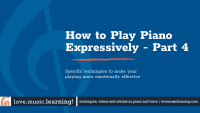
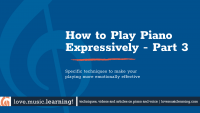
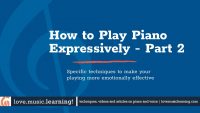
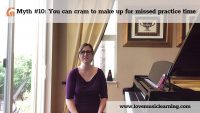

Leave A Comment
You must be logged in to post a comment.